How Stories Change Lives
It was seventh period, and I was growing exasperated. The midday September sun was beating down on Orkeeswa Village in Monduli, Tanzania. Small beads of perspiration ran down the arch of my back as thick rays of sunlight pushed their way through the open windows of Orkeeswa Secondary School.
On most days, I basked in this time of day: the view of Mount Meru peeking through the horizon, the sound of our youngest students singing songs about long vowels, the smell of lunchtime rice and beans still lingering in the air. But on this particular day, I felt defeated, and it was because of the girl, hunched over with her head on her desk, in the very back of the 12th-grade classroom.
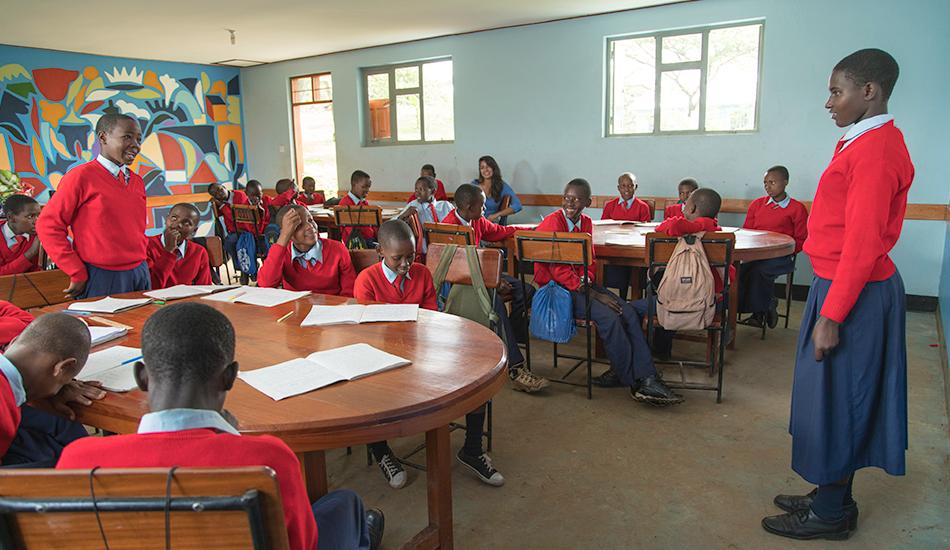
Naserian was a notoriously inattentive high-school senior. If her class was given extra study time, she dozed off. If you passed her during morning teatime, she rarely offered you a smile. And if you attempted to talk with her, she sometimes feigned interest. Her sixth-grade teacher once told me that she was surprised Naserian had made it to her final year of studies; less than 7 percent of girls in rural Tanzania continue their education past 10th grade.
Yet here she was, in her blue-skirt-and-red-sweater Orkeeswa School uniform. She handed me her exercise book as she stared disinterestedly at its scribbled pages. I was leading a writing workshop on personal statements with her class, asking them to answer the prompt, “What experience in your life has been the most meaningful to you and why?” Most students gave thoughtful responses: how losing an entire herd of grazing cattle during a rainy season storm taught the value of persistence, or how helping treat a young boy who had been bitten by a snake in the village inspired one to become a doctor. Naserian finished her essay before most of the class even began.
As I reviewed her story, which was about her teaching experience at a local primary school as part of Orkeeswa School’s community service program, the scrawled handwriting amounted to no more than 300 words.
“OK, Naserian,” I began gently, searching carefully for the right words. “This is a good start, but, well, is this really what you wanted to write about?”
“Yeah, I guess,” she responded. I tried to think of ways to get her to dig deeper and actually want to write this paper. I asked her what she wanted to be when she grew up, and she said she hoped to become a lawyer. When I asked her why, she paused for a few moments before answering.
“Because my aunt was forced to get married when she was 15, and I want to protect women in my community from the practice of child marriage so that no one else will have to go through what she went through.”
I stood in stunned silence for a moment. I had just arrived in the country a few weeks before as a Princeton in Africa fellow. I knew that child marriage is common in Tanzania. Government statistics show that at least one in 10 Tanzanian women will marry before the age of 18. But hearing Naserian so boldly and confidently articulate how committed she was to improving the lives of women in her community — women just like her aunt — made me realize exactly what this young woman was fighting for each and every day that she sat in the back of sunlit classrooms.
“That sounds like it really means a lot to you,” I said. “I think that would make a great essay.”
“So … do I have to do it again?” she asked.
“I won’t make you do anything,” I responded. “But I think if that’s what you’re passionate about, it would make you feel better if you expressed it.”
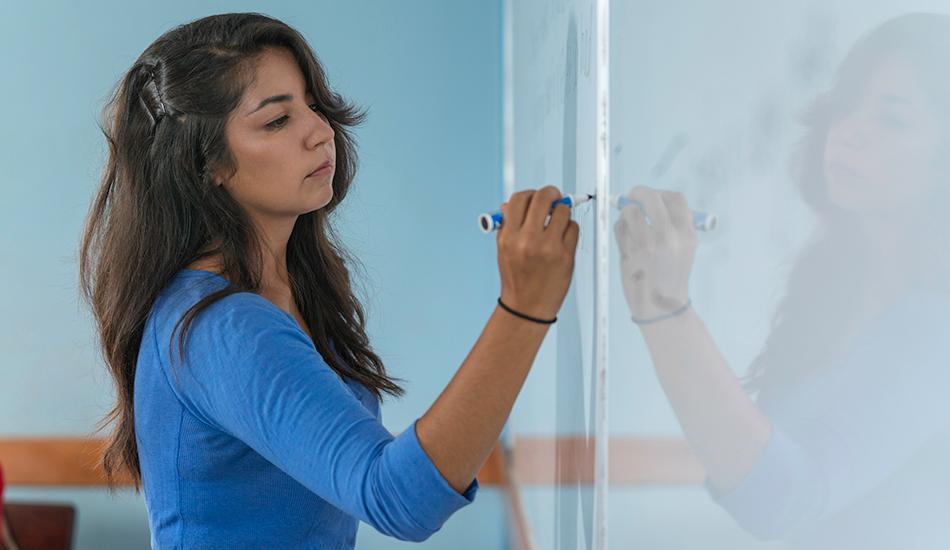
I didn’t expect to hear from Naserian about her paper again. But on the second day of the writing workshop, she called me over to her desk, eager to show me the first line of her new essay. It was as if a spark in her had been ignited.
“One day, when I was in 2nd grade, my aunt was forced to get married just before she could finish primary school,” it began. She went on to explain to me in detail how her aunt was at the top of her class, how she had dreams and goals and the opportunity to have a better life by completing her education. But all of that was taken from her, when her father’s friend took her away to become his third wife.
I asked her questions about how she felt and what words she would use to describe her aunt. Naserian wrote down the answers on a blank page in her exercise book, and the words didn’t stop. Throughout the rest of the class, she raised her hand every few minutes to ask for feedback as she fleshed out the narrative, paragraph by paragraph, ultimately writing a powerful story that described her vision for a safer community for girls and women.
“I want to help Maasai girls who are affected by this bad custom,” she wrote. “That is why I work so hard in school, and that is why I will fulfill my dream of becoming a lawyer in my community.”
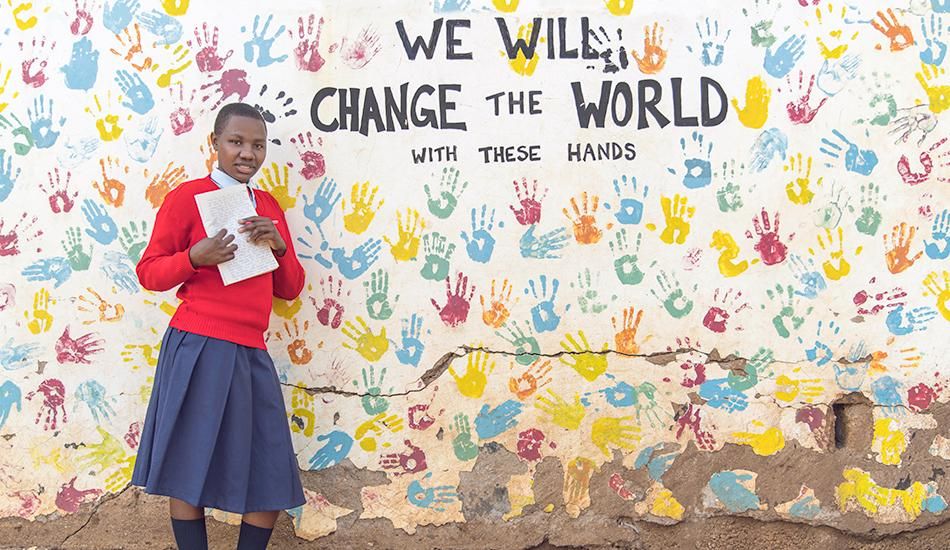
The Power of Storytelling
I have always believed in the infinite power of storytelling: in the idea that sustainable social change begins when everyday citizens have the courage, strength and resilience to share their stories with the world.
When I was a child, I would confidently tell anyone who would listen that I knew what I wanted to be when I grew up: a reporter. For my middle school career day, I shadowed a local television news anchor. For a high school biography project, I wrote an essay about Bob Woodward and Carl Bernstein, the investigative reporters who broke the Watergate scandal. And in any spare moment I had, I devoured nonfiction literature. I still remember sitting in a high-school history class, reading harrowing firsthand accounts of unfathomable devastation from survivors of the Rwandan genocide, wondering if future tragedies might be prevented now that we have heard their stories.
My interest in journalism continued to build at St. Edward’s. As one of the co-founders of the university’s chapter of It’s On Us, a White House initiative to end campus sexual assault, I witnessed how assault survivors were fighting to make campuses a safer place for women by changing the narrative about campus misconduct. As a reporter for the university’s student-run newspaper, Hilltop Views, I covered a keynote address by Texas state Sen. Wendy Davis, who had gained national attention months earlier for her 11-hour filibuster of abortion legislation. And in an Honors course called Justice, Injustice and Faith, I examined how individuals who spoke openly about injustice contributed to post-conflict reconciliation movements like the gacaca courts in Rwanda, and the Truth and Reconciliation Commission in South Africa. Through all of these experiences, I saw that people coming together to listen to previously unheard voices might be the most powerful form of justice there is.
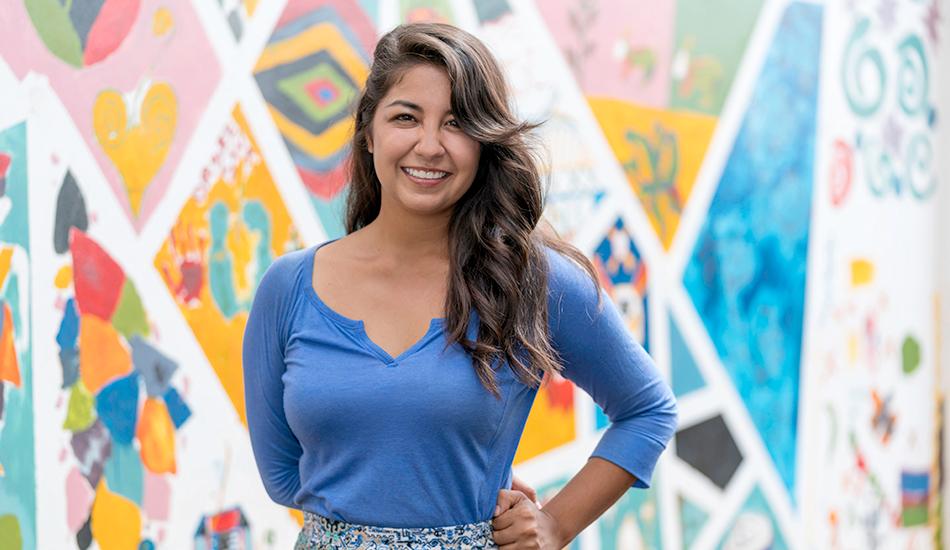
I started to see cracks in my theory when I began working on my Honors thesis on problematic practices in international development. I questioned whether nongovernmental organizations that claim to help developing countries take the time to listen to and understand the communities they enter.
It wasn’t until two years after graduating from St. Edward’s that I finally found answers in a small blue-and-white school tucked behind bumpy dirt roads and sprawling fields of maize and beans in rural Tanzania.
The Orkeeswa School is a co-ed, community-collaborative secondary school operated by the Indigenous Education Foundation of Tanzania (IEFT). Founded in 2008, the organization provides affordable, holistic education to an underserved Maasai community that has graduation rates of less than 1 percent and one of the highest child marriage prevalence rates in the world. IEFT works directly with community leaders and parents to develop strategic goals for the organization. It provides a safe space for students to question and critically analyze issues they identify in their communities. It empowers students to become voices for change by giving them the tools and support to facilitate meaningful conversations about these issues with family members. And most importantly, it recognizes, nurtures and harnesses the potential of young girls so that they can express their goals and dreams while remaining proud and deeply invested in the preservation of their culture.
As girls at Orkeeswa conduct science experiments, coach basketball at neighboring primary schools, start small businesses, write original screenplays, perform in school dramas, create art projects and learn photography, they grow and develop as scholars and leaders in their communities. They pursue interests and passions that they may not have otherwise had access to. And with each achievement, each three-pointer on the basketball court or high mark on an exam, these students challenge the community’s perception of what girls can and should accomplish.
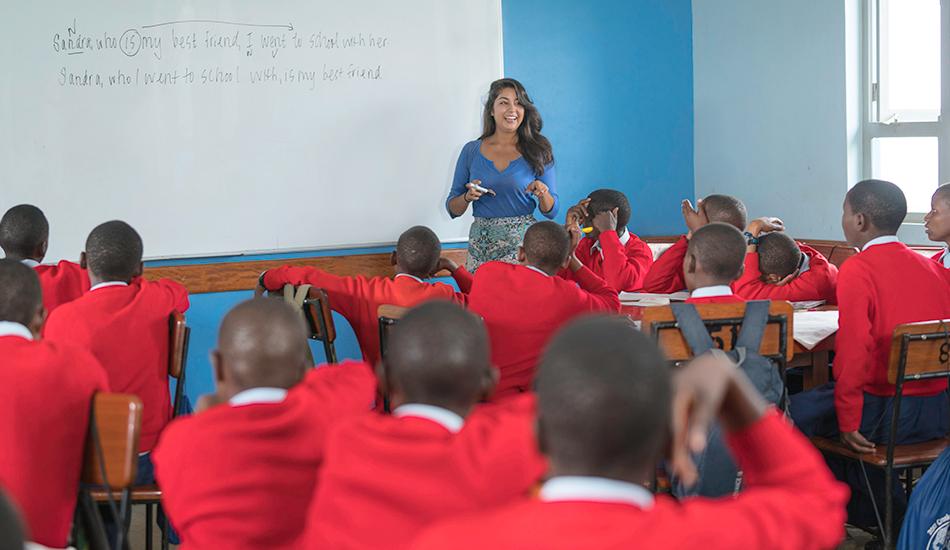
Rewriting the Narrative
It’s now my job as IEFT’s communications fellow to share our students’ stories — their journeys, their challenges, their successes and their dreams — with the world, amplifying their voices for a global audience. I interview young women about what it’s like to be the first person in their families to complete primary school. I have conversations with aspiring doctors and future presidents. I photograph students who are mentoring young girls in their community so that they, too, can defy statistics and continue their education past 6th grade. I speak to so many girls who tell me, “I am the first in my family of seven to make it this far in my studies, and I won’t stop until I prove to other girls in my village that they can achieve their dreams, too.”
I recognize that social transformation does not happen overnight, or within the span of a one-year fellowship. But it does begin when a young Maasai girl becomes the student body president of her school. It continues when a small group of students write, direct and produce an original short film about early marriage, and use it to facilitate dialogues with community leaders by hosting screenings around their villages. It continues still when girls write original screenplays in their Screenwriting Club about the effects of gender discrimination. And gradually, the stories communities tell themselves about women and girls get rewritten.
Having the privilege to learn from these incredible young role models has reminded me of how important it is to listen rather than speak and has made me even more committed to pursuing a career that provides a platform for young women around the world to share their voices and be heard.
Months after my initial interaction with Naserian, she grabbed my arm excitedly as I was walking to lunch. “Madam,” she said, her face beaming as she pulled me into her classroom. “I want to show you the book I wrote.” She ran to her desk, reached into her backpack, and pulled out a handwritten manuscript, scrawled across 50 pages of a yellow exercise book that she had labeled, “Let Us Have One Voice.” I opened it to the first page.
“Most people think a woman is a person who should only stay home to cook and take care of the children,” it began. “But that is not true: A woman is the most powerful person in the world.”
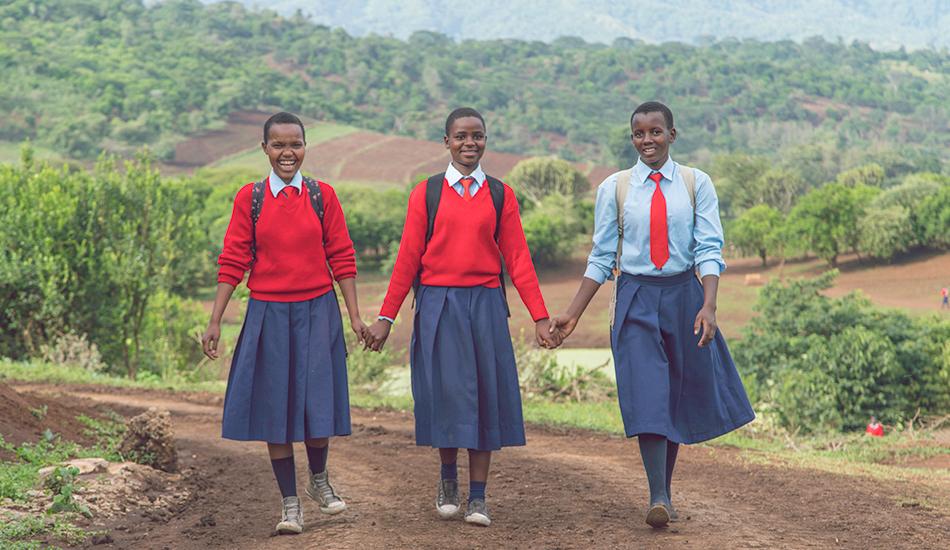
Months into my fellowship, I marvel at how much this community has become home, while being greeted each day by new surprises — small, gentle moments that remind me I am exactly where I need to be. There was the time I sat in a student’s boma for over two hours chatting about Tanzanian politics with her father. And the time I got lost by myself in Lendikinya Village until five very kind women offered me milk and chai before walking beside me, arm in arm, to point me in the right direction. And always, always, there are those times when I have enriching, enlightening conversations with my students that remind me of how much more I have to learn from them than they do from me. When my Princeton in Africa fellowship concludes in September, I plan to continue asking questions and finding answers through multimedia storytelling by reporting on women's rights and social justice issues domestically and abroad.


